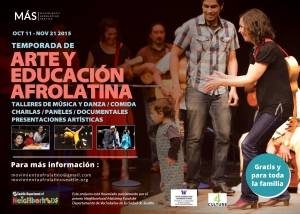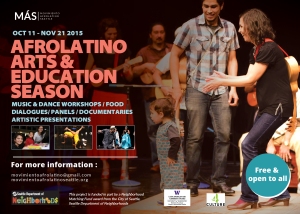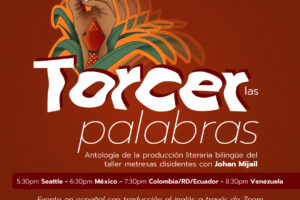Six weeks of diverse Afro-Latino focused arts education events in Seattle Free and open to the general public
Seattle, WA – In accordance with the United Nations’ initiative to declare 2015 – 2024 “The International Decade for People of African Descent” Seattle based arts organization MÁS (Movimiento Afrolatino Seattle) is launching a month-long Afro Latino Arts Education Season this fall (October 11th – November 21st), which includes: film series, lectures, music and dance workshops, and performances featuring arts and artists from Mexico to Argentina and the Caribbean. The season’s goal is to highlight and educate the wider Seattle community about the cultural contributions of Latinos of African descent, a population that has been systematically neglected by and invisible to mainstream society.
The University of Washington campus events are comprised of a film series, two lectures, and a closing performance event. The film series includes four documentaries about the arts as a means to contest racialized domination in Afro-Latinoamerica, which will be followed by a dialogue moderated by film directors, performers, and experts in these disciplines. The films will be shown on Wednesdays (October 14th, 21st, 28th and November 4th) at 6pm through the Ethnic Cultural Center’s Social Justice Film Series (3931 Brooklyn Ave NE, Seattle WA 98195). There will be a lecture on Bachata music and dance by scholar Adam Taub on Friday October 16th at 4:30pm (Thomson Hall 101 – 2023 NE Skagit Ln. Seattle, WA 98195). There will also be a round-table/performance demonstration that will bring together choreographers and dancers: Jose Izquierdo (UW Music and Dance Program Visiting Artist from Peru), Daniel Santos (Brazil), Reinier Valdes (Cuba), and Etienne Cakpo (Benin) for a dialogue with the audience about “Diaspora, Movement and Memory” on Friday November 13th at 3:30pm (Communication CMU 120 – 4109 Stevens Way NE, Seattle WA 98195).
The community-based workshops will be hosted by Casa Latina (317 17th Ave S. Seattle, WA 98144) during five consecutive Saturdays and Sundays. There will be culture, music, and dance classes taught by local and international artists on Mexican son jarocho (the Seattle Fandango Project), Hondura’s Garifuna culture and dance (Wilbor Guerrero and Eufemia Crisanto Figueroa), Panamanian dance (Blanca Prater), Venezuelan gaita music (Roberto Bonaccorso), Colombian music (Diego Coy), Afro-Peruvian cajon drum and dance (Jose “Lalo Izquierdo), movement and historical explorations of Venezuelan culoepuya (Milvia Pacheco), the African roots of tango, milonga and candombe (Mirta Wymerszberg), Brazilian capoeira Angola (Silvio Dos Reis), Afro-Brazilian dance (Dora Oliveira), Afro-Cuban dance (Reinier Valdes), and Afro-Puerto Rican bomba dance (Santiago Crosby).
The closing event for the season will be a final performance at the UW Ethnic Cultural Theater (3940 Brooklyn Ave NE, Seattle WA 98195) on November 21st at 7pm and will feature all of the Afro Latino season teaching artists and their students.
“The racial tensions we are (and have been) experiencing against African descent or Latino citizens in this country is due, among other things, to lack of knowledge and understanding of certain historical events” says MÁS Executive Director Monica Rojas-Stewart. “We at MÁS take a stand and we choose arts as a tool to first empower ourselves to then educate the larger community about these histories for social change and racial equity”.
These events are free and open to the public. The complete calendar of events and registration for the workshops are now available at movimientoafrolatino.org. This event is sponsored by a large matching fund from the City of Seattle’s Department of Neighborhoods, by 4Culture, and by various University of Washington departments including the Latin American and Caribbean Studies program, the African Studies program, the Department of History, the Diversity and Minority Program, the Office of Minority Affairs, the Office of the Provost, the Department of Communications, the Office of the Dean of Undergraduate Studies, the American Ethnic Studies Department, and the Ethnic Cultural Center.















